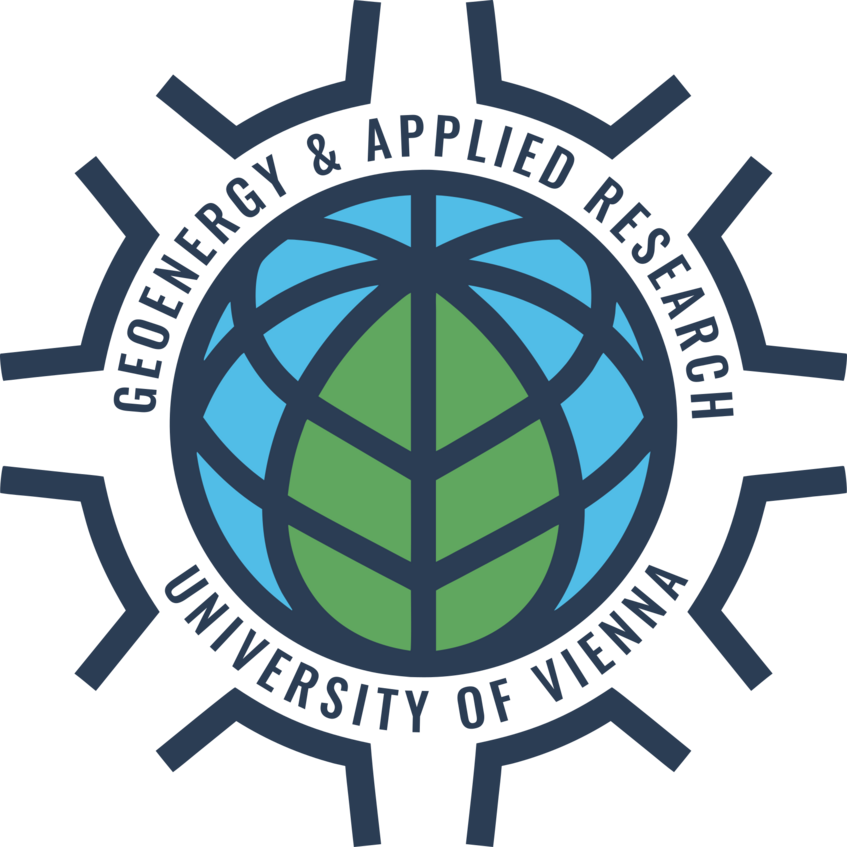GEAR - Geoenergy and Applied Research Lecture Series
Winter 2025/26
Earthscience Colloquium

Earthscience Colloquium
In cooperation with the University of Vienna and the Austrian Geological Society, GEAR (Geoenergy & Applied Research) dedicates the earthschience colloquium of winter 2025/26 to the topic of geoenergy.
Geocenter, UZA II, Eduard Suess Auditorium (HS II), Thursday, 17:00 c.t.
- Do, 09.10.2025 • Wolfgang Schollnberger
How today's geology students from Austria can shape the future energy mix for humankind - Do, 16.10.2025 • Leopold Weber (Geologie-Weber)
Evaluierung von Versorgungsrisiken bei mineralischen Rohstoffen am Beispiel Grafit - Do, 23.10.2025 • Nicola Levi (University of Vienna, NiMBUC)
Technical challenges of deep geothermal exploration with a focus on geomechanics, structural geology and borehole data - Do, 30.10.2025 • Georg Brasseur (Graz University of Technology)
Die Bedeutung von Wasserstoff für die Energiewende - Do, 06.11.2025 • Adrian Brunner (TU Wien)
Shallow Geothermal Energy in the Built Environment: The Role of Energy Geostructures - Do, 13.11.2025 • Holger Paulick (GeoSphere Austria)
Kritische und strategische Rohstoffe in Europa für E-Mobilität und Energiespeicherung - Do, 20.11.2025 • Erika Faigen & Diana Morales (University of Vienna)
Energy and Resources from a perspective of economic geography - Do, 27.11.2025 • Michael Kettermann (Fraunhofer IEG)
Geothermal Energy in Germany: Challenges in Green and Brownfield Exploration - Do, 04.12.2025 • Vincent Roche (Le Mans University)
Following the Trail of Natural Hydrogen Seeps - Do, 11.12.2025 • Peter Keglovic (deeep Tiefengeothermie GmbH)
Tiefengeothermie für die Dekarbonisierung der Fernwärme Wien
GEAR - Geoenergy and Applied Research Lecture Series
Winter 2024/25
- Do, 10.10.2024 • Gabor Tari (OMV)
Natural hydrogen exploration: Where do we stand?
Abstract - Do, 17.10.2024 • Peter Krois (deeep Tiefengeothermie GmbH)
Heat for Vienna - deep geothermal energy in an urban environment
Abstract - Do, 24.10.2024 • Chi Zhang (University of Vienna)
Using geophysics in carbon dioxide removal technologies: innovative approaches and emerging technologies
Abstract - Do, 31.10.2024 • Kurt Decker (University of Vienna) & Helene Bauer (Wiener Wasser)
Structural characterisation of fractured reservoirs
Abstract - Do, 07.11.2024 • Jakob Kulich (GeoSphere Austria)
CO2 Storage potential in Austria and its competitive subsurface usage
Abstract - Do, 14.11.2024 • Clement Esteve (University of Vienna)
Passive seismics: a cost-effective approach for geothermal exploration
Abstract - Do, 21.11.2024 • David Misch (Montanuniversität Leoben)
Seal rock investigations for geological storage
Abstract - Do, 28.11.2024 • Stefan Hoyer (GeoSphere Austria)
Numerische Modellierung als Thermalwasser-Managementtool
Abstract - Do, 16.01.2025 • Martin Schöpfer (University of Vienna / NiMBUC Geoscience)
Fluid injection-induced reactivation of corrugate faults
Abstract - Do, 23.01.2025 • Alessandro Musu (University of Vienna)
Quantifying the chemical evolution of magmatic systems using mineral chemistry: a combined experimental and statistical approach
Abstract - Do, 30.01.2025 • Rainer Abart (University of Vienna)
Green hydrogen from solar thermal water splitting: a hot topic in (geo)materials research
Abstract
